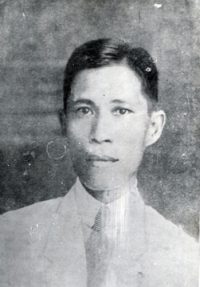At daylight it was raining. At 9 a.m. we received the news that the Americans were at the entrance to the town, and, as we only had a small force, our rear guard not having yet arrived, we at once took up the march for Alava, where there are some of General Tinio’s forces. We arrived in that town at about 12 o’clock in the day and kept up the march toward Rosario, the next town, passing through woods.
The president’s wife had a fainting spell or swimming of the head. We halted. She was soon all right. We arranged a bamboo cot for her. Then all at once appeared General Tinio with his few troops, announcing to us that the Americans were pursuing us. We at once took up the march. The rain was heavy and we were drenched. At 3 o’clock p.m. we reached Rosario. We passed on, commencing for the first time to ascend the mountains of the Famy settlement or ranch. The rain was incessant and there was a great deal of mud. The hard wind and the cold made us shiver. We continued the ascent of the mountain, and, as we had already reached an elevation of 500 meters, it seemed that we were at a great altitude and pretty close to the sky.
But 5 o’clock in the morning arrived, and still we had not reached the summit. We kept up the march in the midst of a pouring rain, and just about 8 p.m. we arrived at the Famy settlement, located on the peak of the mountain. We were all wet and had no clothes for making a change, as the rear guard soldiers had our luggage with them.
Being half dead from the effects of the rain, wind, and cold, and wishing to avoid bad results, we had to immediately enter the house that were here, and without delay we kindled fires in the “calans,” or native stoves, of the houses. We at once drew near the fires so the warmth might relieve us, and at the same time we took off our clothes in order to dry them.
As soon as we were somewhat restored by the warmth we ate; that is, each of us ate a little, since there was not sufficient to satisfy the the cravings of our stomachs. Afterwards we again turned our attention to the “calans,” or native stoves, in order to continue drying our clothes, but we only finished this at about 1 o’clock in the morning, and then we went to sleep.
